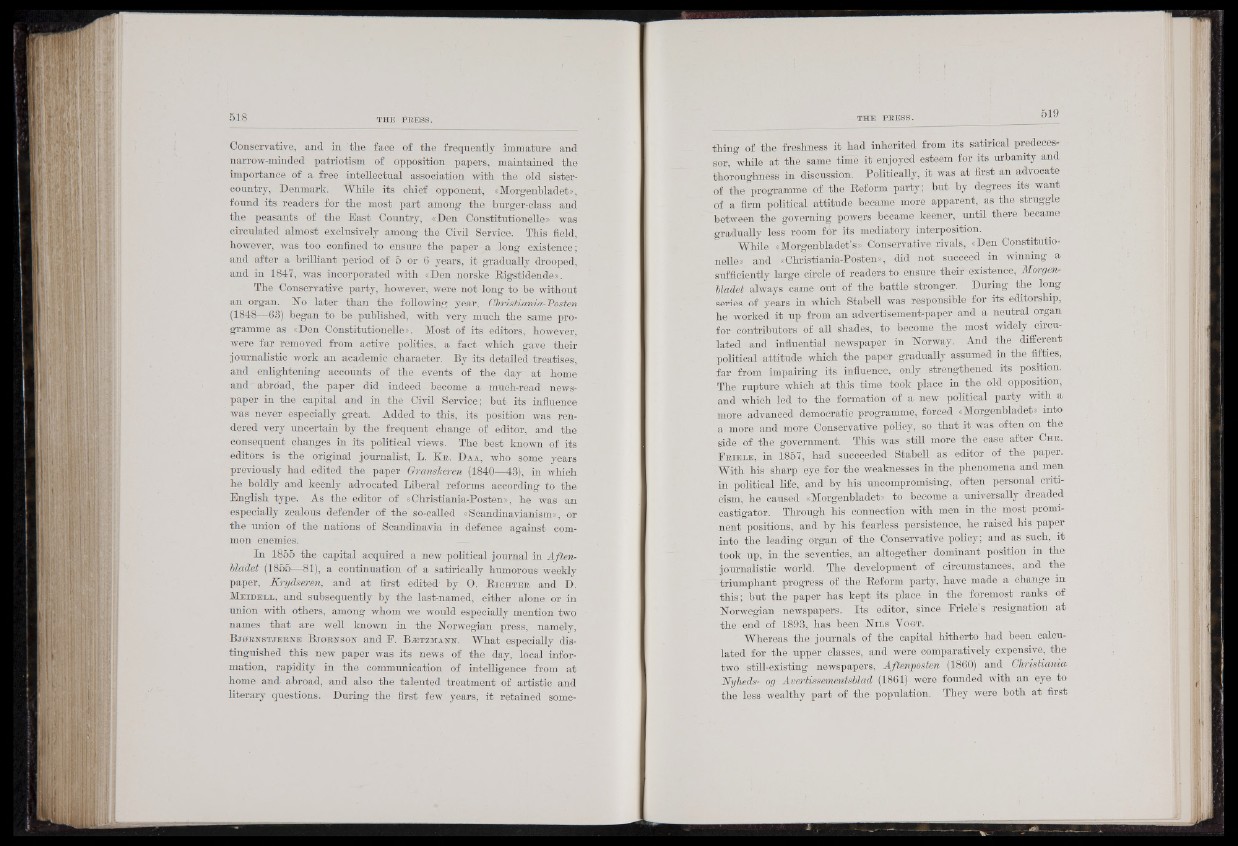
Conservative, and in the face of the frequently immature and
narrow-minded patriotism of opposition papers, maintained the
importance of a free intellectual association with the old sister-
country, Denmark. While its chief opponent, «Morgenbladet»,
found its readers for the most part among the burger-class and
the peasants of the East Country, «Den Constttutionelle» was
circulated almost exclusively among the Civil Service. This field,
however, was too confined to ensure the paper -.a long existence ;;
and after a brilliant period of 5 or 6 years, it gradually drooped,
and in 1847, was incorporated with «Den norske Rigstidende».
The Conservative party, however, were not long to be without
an organ. No later than the following year, Christiania-Posten
(1848—63) began to be published, with very much the same programme
as «Den Constitutionelle». Most of its editors, however,
were far removed from active politics, a fact which gave their
journalistic work an academic character. By its detailed treatises,
and enlightening accounts of the events of the day at home
and abroad, the paper did indeed become a much-read newspaper
in the capital and in the Civil Service; but its influence
was never especially great. Added to this, its position was rendered
very uncertain by the frequent change of editor, and the
consequent changes in its political views. The best known of its
editors is the original journalist, L. K b . Daa, who some years
previously had edited the paper Granskeren (1840—43), in which
he boldly and keenly advocated Liberal reforms according to the
English type. As the editor of «Christiania-Postern», he was an
especially zealous defender of the. so-called «Scandinavianistn»,- or
the union of the nations of Scandinavia in defence against common
enemies.
In 1855 the capital acquired a new political journal in Aften-
bladet (1855—81), a continuation of a satirically humorous weekly
paper, Krydseren, and at first edited- by 0. R i c h t e b and D.
M e i d e l l , and subsequently by the last-named, either alone or in
union with others, among whom we would especially mention two
names that are well known in the Norwegian press, namely,
Bj o b h s t j e b n e B j 0b n s o h and E. B j e t z m a n n . What especially distinguished
this new paper was its news of the day, local information,
rapidity in the commuhication of intelligence from at
home and abroad, and also the talented treatment of artistic and
literary questions. During the first few years, it retained something
of the freshness it had inherited from its satirical predecessor,
while at the same time it enjoyed esteem for its urbanity and
thoroughness in discussion. Politically, it was at first an advocate
of the programme of the Reform party; but by degrees: its want
of a firm political attitude became more apparent, as the struggle
between the governing powers became keener, until there became
gradually less room for its mediatory interposition.
While «Morgenbladet’s» Conservative rivals, «Den Constitutio-
nelle» and «Christiania-Posten»-, did not succeed in winning a
sufficiently large circle of readers to ensure their existence, Morgen-
Uadet always came ouirof the battle stronger. During the long
series of years in which Stabell was responsible for its editorship,
he worked it up from an advertisement-paper and a neutral organ
for contributors of all shades, to become the most widely circulated
and influential newspaper in Norway. And the different ■
political attitude which the paper gradually assumed in the fifties,
far from impairing its influence, only strengthened its position.
The rupture which at this time took place in the old opposition,
and which led to the formation of a new political party with a
more advanced democratic programme, forced «Morgenbladet» into
a more and more Conservative policy, so that it was often on the
side of the government. This was still more the case after C h r .
E r i e l b , in 1857, had succeeded Stabell as editor of the paper.
With his sharp eye for the weaknesses in the phenomena and men
in political life, and by his uncompromising, often personal criticism,
he caused «Morgenbladet» to become a universally dreaded
castigator. Through his connection with men in the most prominent
positions, and by his fearless persistence, he raised his paper
into the leading organ of the Conservative policy; and as such, it
took up, in the seventies, an altogether dominant position in the
journalistic world. The development of circumstances, and the
~ triumphant progress of the Reform party, have made a change in
this; but the paper has kept its place in the foremost ranks of
Norwegian newspapers. Its editor, since Eriele s resignation at
the end of 1893, has been N i l s V o g t .
Whereas, the journals of the capital hitherto had been calculated
for the upper classes, and were comparatively expensive, the
two still-existing newspapers, Aftenposten (1860) and Christiania,
Nyheds- og Avertissementshlad (1861) were founded with an eye to
the less wealthy part of the population. They were both at first